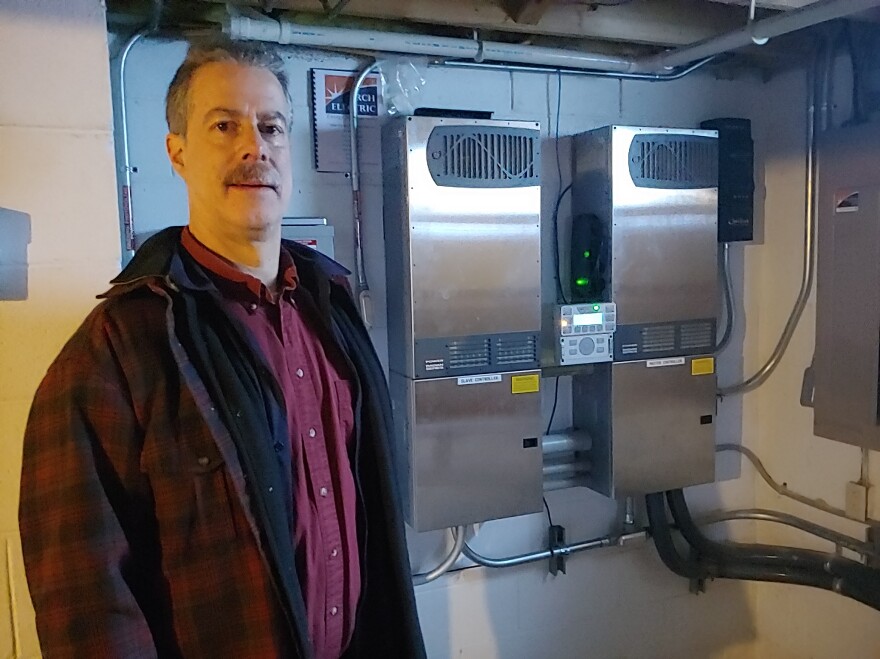Gov. Tony Evers caused a bit of a stir this year when he said Wisconsin should have a goal of generating carbon-free electricity by the year 2050. That would mean no coal-fired power plants in the state, and several other changes. Energy experts say one of those changes would likely involve more use of devices to temporarily store electricity from cleaner sources like solar and wind power.
READ: Could Wisconsin Utilities Go Carbon-Free By 2050?
Republicans in the state Legislature have since removed the carbon-free language from the Democratic governor’s state budget proposal, arguing it’s a policy item.
But some Wisconsin utilities have promised to reduce their carbon emissions, and other states are aiming to eventually go carbon free.
And, some homeowners have already discovered energy storage.
West Bend resident Peter Gibeau has a storage unit in his basement that he keeps in two plastic boxes. Inside each container — known as a battery bank — are eight, flooded lead-acid batteries. Other equipment called inverters, charge controllers, and disconnects are nearby.

Gibeau says the unit takes in and stores electricity generated by 23 solar panels on the roof of his house. "During the day, the solar panels charge up the batteries. Then, during the night, when there's no sun, everything is coming off the batteries," he explains.
He's had the battery storage system for about three years. Gibeau says it provides his household more energy independence, and far lower utility bills — though his home is still connected to the electrical grid as a backup.
Gibeau also believes he's helping reduce pollution from coal or natural gas-fired power plants. "It's also my midlife crisis," he jokes. "So, this whole system was a lot cheaper than a Porsche."
The cost was reduced, Gibeau says, with federal tax credits and financial help from the state's Focus On Energy renewable energy program.
Installers of energy storage systems say improved technology is making storage more attractive.
In the warehouse of Arch Electric in Plymouth, owner Ed Zinthefer slices open a cardboard box containing a battery unit about the size of a large DVD player.

"This is a lithium cell, and we can stack as many as six of these in one unit, getting up to about 19.6 kilowatt hours of storage," Zinthefer explains.
Kilowatt hours, or kWh, is a measure of power consumption. 19.6 kWh is likely enough storage to power an average home for at least a day.
The growth in lithium storage batteries is changing the game for homeowners, Zinthefer says. "We can put more storage in a residence now than we could a couple years ago because we can pack more kWh into a lithium battery than we can in a flooded lead-acid battery."
He cautions that one lithium battery unit can cost a few thousand dollars, and that energy storage isn't yet right yet for every home. But Zinthefer says it's getting more affordable.
"Refinements, cost reductions. In the last year, we've seen about a 10% decrease in the cost of our lithium-based batteries. And, if that trend continues, it's only a matter of time before every consumer has the good opportunity to make that financial decision," he says.
Some hospitals and other institutions are also using battery storage. And lately, even some Wisconsin electric utilities and transmission firms are considering much larger storage systems that could set aside power for whole communities.
The Midwest Energy Research Consortium, or M-WERC, recently held a Milwaukee forum on utility-scale energy storage. UW-Madison Professor of Energy Finance Tim Baye took part. He says some of the utility interest is realizing some consumers want more control over their home's energy supply through devices like programmable smart phone apps.
"The millenials, the Gen-Xers, all want that type of ability, and we're starting to see these market forces come into sync," Baye says.

But part of utility-scale energy storage may need state regulation. And Public Service Commission Chairperson Becky Valcq says one of her goals will be to make sure people who can afford storage units don't push up electricity costs for those who can't.
"I always think of it as sort of a water balloon. If you're pushing on it, on one end, it's gotta go someplace else," she says.
Valcq says it's possible the PSC will open what's called a generic docket, or investigation, to ask more questions about what energy storage would mean for everyone.
Support is provided by Dr. Lawrence and Mrs. Hannah Goodman for Innovation reporting.

Do you have a question about innovation in Wisconsin that you'd like WUWM's Chuck Quirmbach to explore? Submit it below.
_




